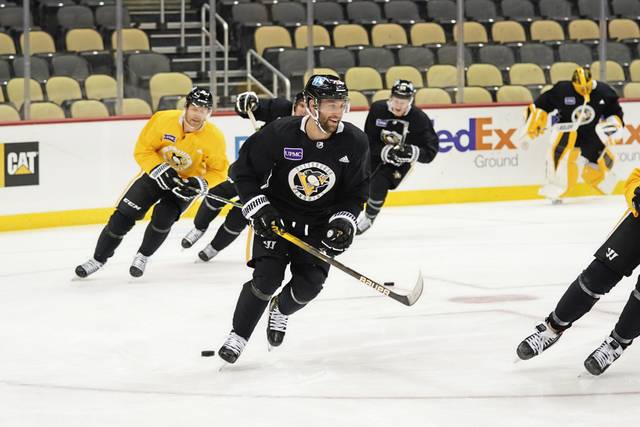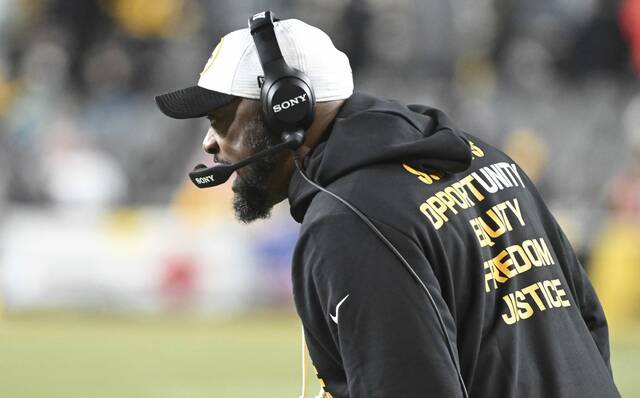Jason Zucker was a pretty happy man Tuesday.
As a former captain of the United States’ entry in the International Ice Hockey Federation (IIHF) World Junior Championship tournament in 2011, the Las Vegas native took a lot of pride watching the current team earn gold with a 2-0 win against rival Canada during Tuesday’s championship game in Edmonton.
“It was great,” the Penguins forward said via video conference on Wednesday. “Obviously, I’m a proud USA Hockey guy. I’m proud to say I made a little bit of money on that. It was a lot of fun. It was good to have locker room banter. Obviously, we’ve got a lot of proud of Canadians in there that are a little bit upset.”
Establishing such camaraderie with his teammates has been a disjointed process. Acquired in a trade Feb. 11, Zucker had his Penguins tenure disrupted March 12 when the NHL went on hiatus because of the coronavirus pandemic.
The team reunited in July for a training camp leading into the NHL’s postseason tournament in August. Part of the protocol for participating in the tournament involved being in a “bubble,” a segregated zone involving a luxury hotel and a handful of surrounding venues that was restricted to NHL players as well as team and league staffers.
Zucker found benefit in that forced boding, even if the Penguins lasted all of four games in the tournament.
“When I got traded, 30 days after the season got shut down,” Zucker said. “I kept in touch with the guys, but it was a little bit tougher just because I hadn’t built that bond with everybody quite yet. It was great to have the bubble and be able to get to know everyone a little bit more. … Now, coming into (training) camp, it’s definitely a lot more comfortable. I feel like I know the guys a lot more.”
Zucker should have some familiarity with his linemates a handful of days into training camp. He skated on the left wing of the team’s second line with Evgeni Malkin at center and Bryan Rust on right wing during the Penguins brief postseason run.
“A guy like (Malkin) is such a world-class talent as far as passing, just the overall game. So for me, I feel like I could keep my game simple like I want to play. I’m not a fancy east-west guy. We, obviously, know how (Malkin) plays. (Rust) is very similar to me in the sense that he wants to play more of a gritty, north-south game as well. If we can use our speed wide, try to put (defensemen) back, we can give (Malkin) a lot of open space to make some plays. At that point, we’re trying to finish plays that he gives to us and find him when he’s open. Keep more of a simple game for us wingers and let (Malkin) have his creativity and make his plays.”
Zucker was acquired for his speed as much as the scoring ability that has allowed him to reach the 20-goal mark five times in his nine NHL seasons, primarily spent with the Minnesota Wild.
“One of the things that excited us about acquiring Jason was his footspeed,” coach Mike Sullivan said. “He can really skate, and we want to try to harness that strength that he has.”
“With the style of play that we’re trying to play, we’re certainly trying to get our guys to play a more efficient game, a speed game, a north-south game where we’re encouraging footraces. We’ve got a fair amount of guys that we think puts them in positions to play to their strengths when we do that. And Jason is one of those guys.”
In addition to gaining enough comfort with his teammates to chide them along provincial lines, Zucker far more familiar with how to play with them.
“It’s a little bit different than what he was accustomed to when he played for his prior team in Minnesota,” Sullivan said. “Sometimes, that’s a process with a player because things come habitual. Sometimes you have to unlearn certain things in order to learn new things. Jason went through that process with us last year.
“We’re trying to encourage him to utilize his speed, both with the puck and without the puck. If he has the puck, great. If he doesn’t, then we want to put our opponents under pressure. When we do that, we think we can force loose pucks and create offense different ways. … Certainly, in watching him in his time here since he’s been here, I think he’s much more comfortable with how we’re trying to play.”
The way Zucker explains it, that comfort comes out of keeping things simple.
“I feel that it’s a very up-tempo system, trying to read plays a lot more and not being very robotic with a lot of things,” he said. “A lot of it is based off of reading plays and just playing hockey. And then playing fast. I love to be able to use my speed.
“I feel when I’m playing my best hockey, I’m using my speed to my advantage and getting in on my pucks whether that’s forechecking or attacking defensemen with the puck. I do feel the system is great for me personally, but I feel it really feeds into the entire that we’ve built here.”
Note: The Penguins had a scheduled off day Thursday.








